Submitted by Maude Blanchet-Léger on
par Maude Blanchet Léger
Vendredi le 28 août 2020, je rejoins Batone à la van chez Exeko. Nous nous dirigeons sur la rue Sherbrooke et sur le chemin, nous apprenons à nous connaître et il m’explique son approche en tant que médiateur. Batone est guitariste et chanteur; il compose ses propres chansons et se sert de ses talents de musicien pour interagir avec les gens dans la rue. Il a tendance à plutôt se laisser porter par le rythme des personnes rencontrées pour ses interventions, car selon lui, c’est plus naturel d’aller à la rencontre des gens de cette manière et d’avoir une conversation que lorsque tout est trop planifié.
Batone stationne la van sur Sherbrooke, à la hauteur de la rue Kennedy, à quelques mètres d’un muret où sont assis cinq hommes. Au même moment où nous nous avançons vers eux, trois jeunes femmes sortent d’une voiture avec de gros sacs remplis de sandwichs et en offrent aux hommes. Nous allons chercher du matériel et Batone prend sa guitare et nous commençons à parler aux filles à côté de la van. Les trois amies ont décidé de leur propre initiative qu’à chaque vendredi, elles allaient sillonner les rues de Montréal et donner de la nourriture aux personnes en situation d’itinérance.
Batone et moi les trouvons vraiment inspirantes et on leur explique la mission d’Exeko. Elles nous demandent aussi où est-ce qu’elles peuvent trouver plus de gens qui auraient besoin de nourriture et Batone leur pointe quelques endroits qu’il connait dans le centre ville. Un coin plus loin, un homme, Marco*, est souvent assis à côté de l’épicerie sur l’Avenue du Parc. Elles marchent vers cette direction et Batone et moi retournons voir les cinq personnes avec le matériel et la guitare.
Ils nous accueillent avec joie et nous leur demandons s’ils aimeraient avoir un calepin et un stylo pour écrire ou un cahier et des crayons pour dessiner. Ils acceptent le matériel pour écrire, mais l’un d’entre eux, assis au bout, me dit qu’il préfère dessiner. Son voisin de gauche commence à écrire instantanément et rempli la première page qu’il signe et date au bas. Il nous montre son texte et j’ai le temps de lire: « Ma vie dans la rue est difficile, mais c’est une vie. » Il dit nous en même temps, « tu sais, c’est une vie, c’est une vie… » dans une sorte de sérénité. Je vais ensuite chercher un cahier et une boite de crayons de couleur pour celui qui voulait dessiner. Cet homme dégage une énergie très calme et je remarque qu’il porte un léger sourire sur son visage depuis notre arrivée. Dès qu’il a en main son cahier et ses crayons, il se met à dessiner le profil de son voisin, qui lui est concentré sur Batone qui joue de la guitare et chante.
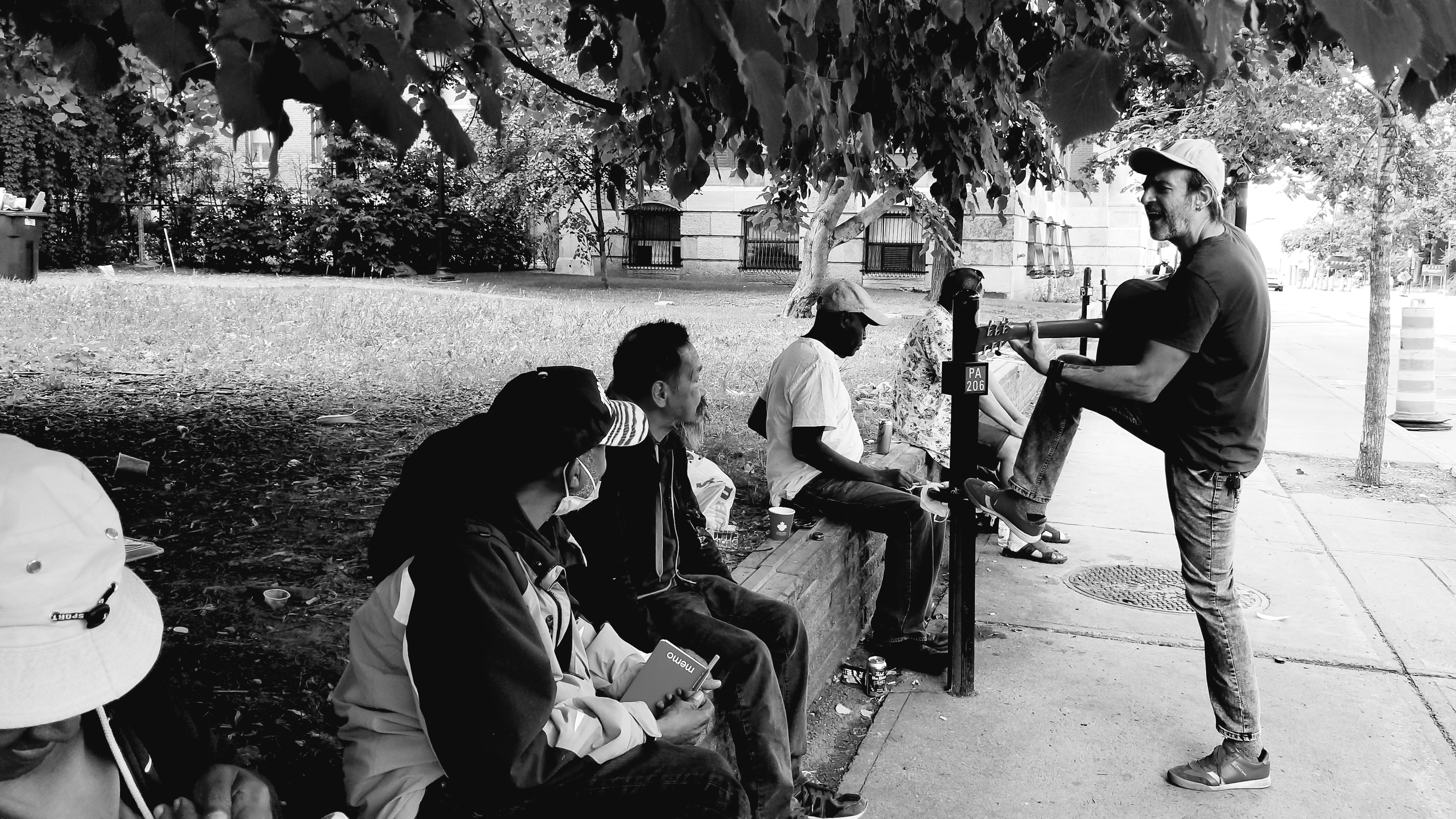
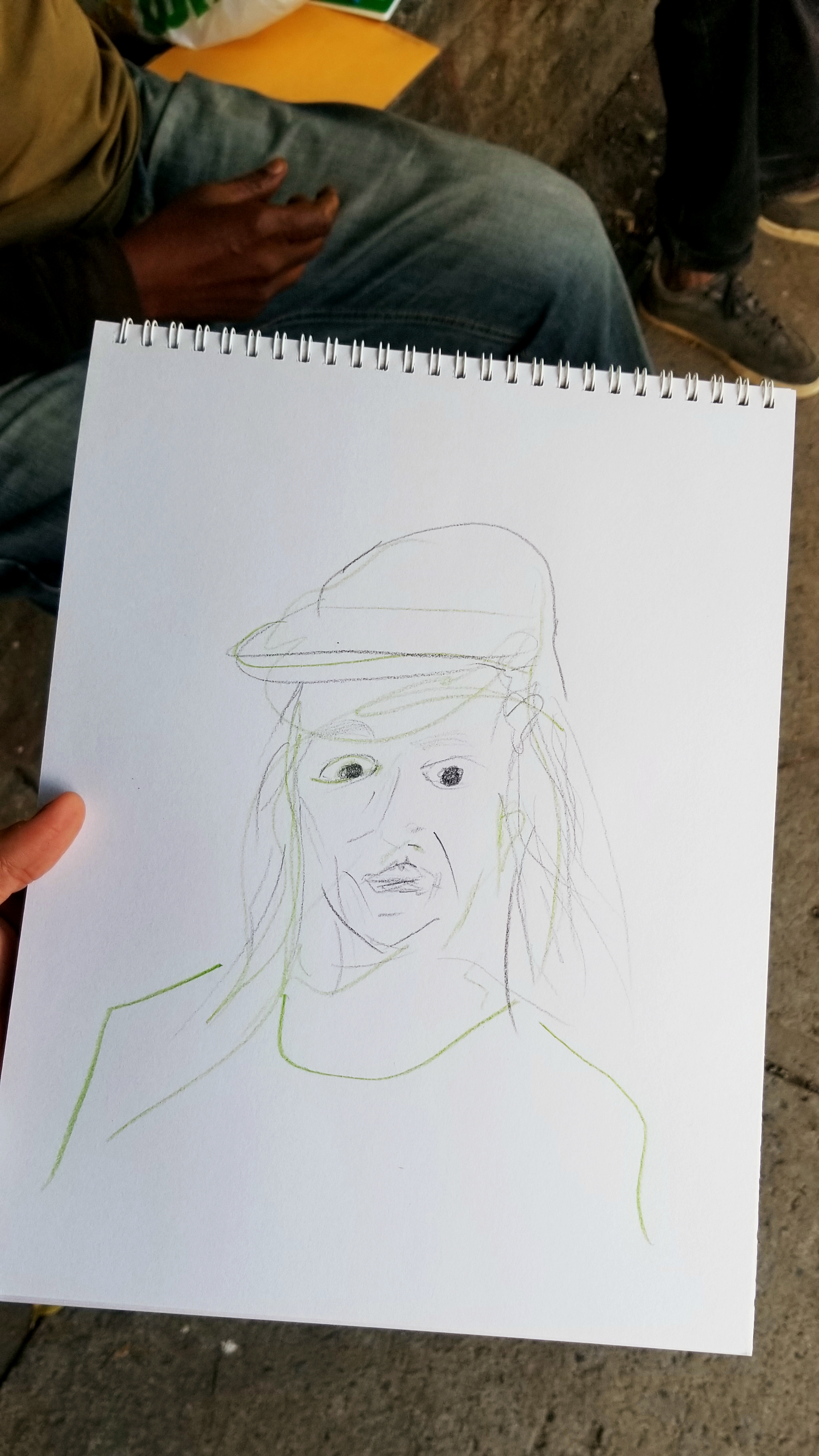
Ce sont surtout les deux autres qui portent beaucoup attention à la chanson de Batone. Je les vois sourire, bouger au rythme de la musique et celui qui écrivait tappe maintenant des mains et fais des pouces en l’air à Batone. Le dessinateur me dit alors « Je vais te dessiner maintenant! » J’accepte et je tente de bouger le moins possible. Il me montre son dessin en me disant que c’est difficile de faire les yeux et je suis d’accord, c’est la partie la plus compliquée à dessiner dans le visage! Je lui dit qu’il n’y a pas de presse, il peut le continuer s’il veut. Il décide alors de rajouter de la couleur. Je lui demande sa permission pour photographier son oeuvre et il accepte. C’est agréable de voir l’ouverture, le désir de participation et l’enthousiasme de ces hommes. Tout cela ainsi que les trois filles que nous avons croisé plus tôt me donnent un renforcement d’espoir et de bonne humeur.
Nous continuons ensuite notre route pour aller rejoindre Marco sur l’Avenue du Parc. Batone, qui le connaît bien, le salue et lui demande s’il a envie de jaser. Il acquiesce et nous sortons de la van. Il nous raconte qu’il s’est fait voler toutes ses choses; nous lui proposons alors de lui redonner un carnet et un stylo. Je lui demande par qui il s’est fait voler et il me répond « Par d’autres personnes dans la rue… Ils volent les pauvres au lieu de voler les riches! » Au moins, il a enfin trouvé un endroit où il peut dormir et où on le laisse tranquille. Il est à la recherche depuis un an et huit mois d’un logement, ou même juste d’une chambre où il pourrait habiter, mais tout est trop cher, même s’il met tout son argent de côté dans son compte de banque. Il voit son travailleur social la semaine prochaine, qu’il connaît depuis deux ans. Il a pris une petite pause de recherche de logement ce mois-ci, parce qu’il était trop fatigué et découragé de ne rien trouver. Il nous parle aussi de ses souliers troués, Batone lui demande quelle taille il fait: du dix ou du dix et demi.
Nous lui demandons ensuite s’il a croisé trois filles avec des sacs et des sandwichs, mais il dit que non, ça fait seulement 20 minutes qu’il est arrivé. L’instant d’après, nous voyons les filles qui arrivent vers nous! Batone les présentent et elles proposent à Marco un sandwich, mais il n’a pas faim et ne veut pas le garder pour plus tard. Il dit qu’il préfère que les sandwichs soient donner à des gens qui ont faim. Je suis surprise, et Batone aussi d’ailleurs, qu’il ne veuille pas en garder un. Il ne semble pas s’inquiéter pour l’avenir, d’une bonne manière. Batone et moi parlons plus tard de comment nous passons notre temps à nous construire une sensation de fausse sécurité et de contrôle sur tout, alors que nous ne savons jamais vraiment ce qu’il peut nous arriver. Sauf que lui, Marco, il se dit tout simplement ça va bien aller et même s’il semblait fatigué, je pouvais voir de l’espoir dans ses yeux doux et bienveillants.
Avant que les filles partent, Batone leur parle de Métissages Urbains et il leur suggère d’écrire à Exeko si elles veulent faire du bénévolat avec nous, car la van permet de vivre une toute autre expérience et offre une mobilité partout dans Montréal. L’une d’elles prend la van en photo, où l’on peut voir le site web d’Exeko et elles continuent leur chemin.
Nous disons aurevoir à Marco et lui souhaitons de trouver un logement et une bonne rencontre avec son travailleur social. Batone avait ensuite prévu d’aller au campement sur Notre-Dame, mais sur le chemin, nous croisons un groupe d’une quinzaine de personnes en situation d’itinérance sur la rue Milton au coin de l’Avenue du Parc. Nous faisons alors le tour du bloc pour placer la van devant eux. En ouvrant la porte de la van, un homme voit l’étui de guitare et un grand sourire apparaît sur son visage. Il veut en jouer, mais Batone lui propose plutôt d’en jouer pour lui. Je donne aussi deux sacs de matériel d’art et des bouteilles d’eau à ceux et celles qui étaient intéressé.es.
C’est alors qu’une dame sort d’un magasin à côté en disant aux personnes assises par terre: « Je suis désolée, mais je vais vous demander de ne pas rester en face de mon magasin s’il-vous-plaît. » Un homme lui répond gentiment, « Désolée madame, on se tasse. » Elle semble nous remarquer par la suite et regarde la van en nous demandant « Vous êtes qui vous? » Batone lui explique alors que faisons de la médiation à travers la créativité et la philosophie. Elle nous regarde, perplexe, mais je vois qu’elle se sent mal d’avoir intervenue et ressent le besoin de justifier ses gestes. Je comprends sa situation; elle explique que ça devient vite insalubre devant sa boutique et qu’elle essaie seulement de gagner sa vie. Batone lui dit qu’il comprend aussi, mais que Exeko est très sensible à la situation des personnes autochtones à Montréal et partout au Canada. Elle répond qu’on devrait, dans nos interventions, dire aux gens où aller, de ne pas rester devant des endroits privés, comme son magasin. Malheureusement ce n’est pas si simple que ça. Depuis la pandémie, tous les refuges manquent encore plus de place, sans parler des répercussions encore très présentes du post-colonialisme sur les communautés autochtones. Néanmoins, on ne s’éternise pas, la dame finit par entrer à l’intérieur et nous continuons notre route.
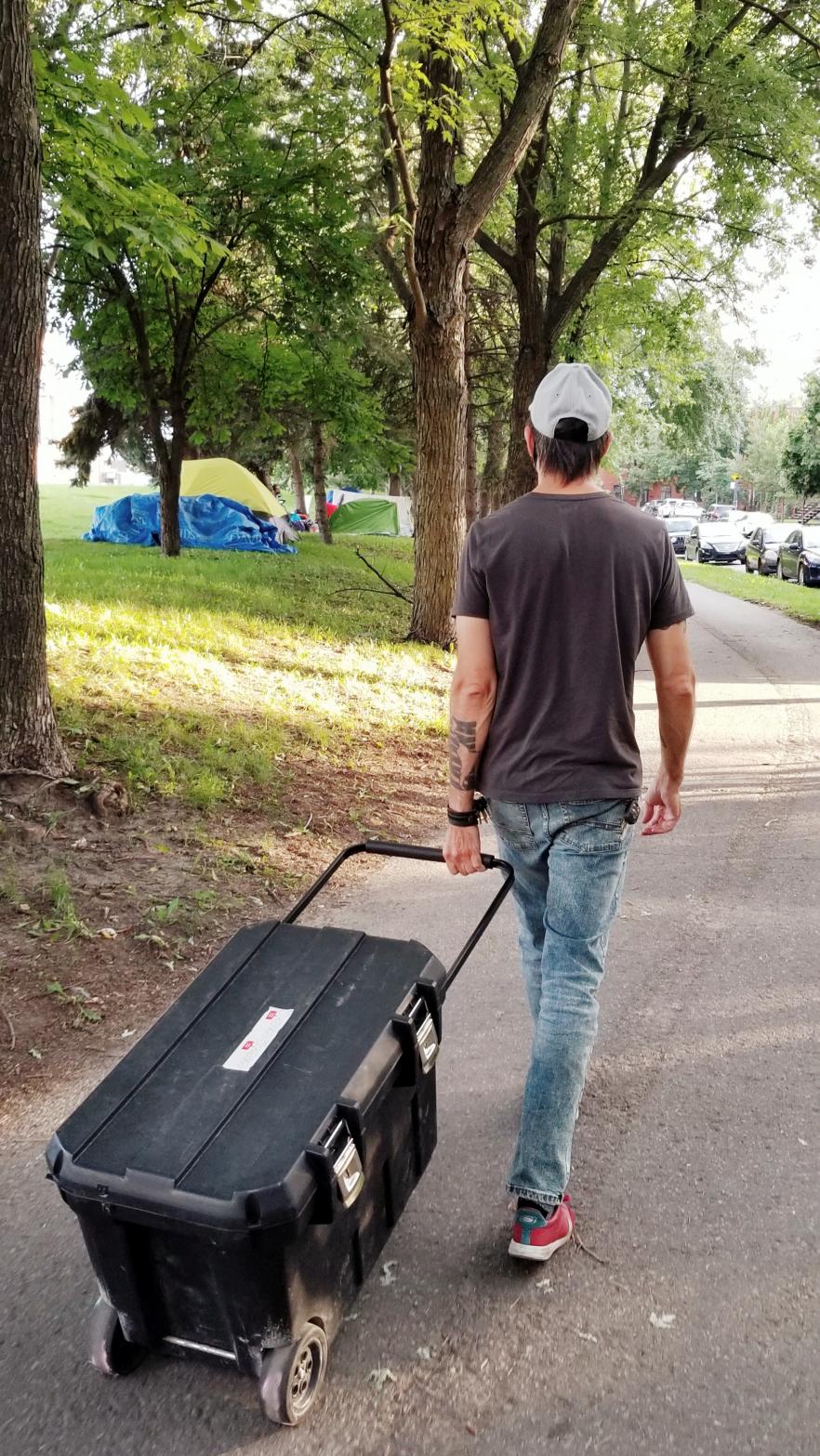
Nous arrivons à côté du parc Morgan, dans Hochelaga, mais en se stationnant, je vois un petit campement de trois tentes, alors je propose à Batone d’aller là puisque nous n’avons vu personne en situation d’itinérance dans le parc. Il est d’accord et nous nous dirigeons avec la boîte de livres et de lunettes de vue que nous avons aussi remplie de carnets, de crayons, de mots croisés, de masques, etc.
Quatre personnes nous accueillent chaleureusement sur leur campement. Nous nous présentons et leur disons que nous avons des livres et toutes sortes de matériel pour eux, en ouvrant la boîte. Une jeune femme s’approche de moi, émerveillée par les livres. Je l’aide à chercher ceux en anglais et nous en trouvons deux, mais elle en prend deux autres en français qu’elle trouvait intrigants. Elle prend aussi un livre de mots cachés et très excitée, elle dit à son ami de venir se choisir une paire de lunettes. Je les aide aussi à choisir la paire et il décide d’y aller avec une verte.
Ils retournent ensuite s'asseoir et parlent avec Batone. Pendant ce temps, l’autre homme vient vers moi et choisi lui aussi une paire de lunettes et trois livres. En s’assoyant, il nous dit qu’il pourra enfin se remettre à la lecture, que ça l’aide à l’endormir le soir et dit en riant que ça lui prend « deux phrases, et puis pouf! » et nous rigolons ensemble. La jeune femme dit qu’elle aime lire, mais elle aime aussi dormir, parce que le lendemain matin, c’est une nouvelle journée et tout recommence à nouveau: il y a de l’espoir. Elle et son copain nous explique que leur logement a passé au feu en mars et que depuis, ils n’arrivent pas trouver un autre endroit. La jeune femme inuit nous dit avec la voix un peu tremblante, une boule à la gorge, qu’elle a une maison « vraiment vraiment au Nord », en faisant un mouvement de tête vers le haut, mais qu’elle essaye de… Qu’elle essaye! ne terminant pas sa phrase. Ils expliquent aussi qu’ils n’aiment pas trop se mêler aux grands groupes, comme le plus gros campement un peu plus loin à l’Ouest. Batone les félicite pour l’ambiance et l’environnement qu’ils ont réussi à créer ensemble, entre amis. C’est vrai qu’on se sentait bien avec eux, ils m’inspiraient confiance et paisibilité.
Nous rangeons la boîte et bougeons la van jusqu’au grand campement. Nous la laissons derrière ce qui semble être une cafétéria communautaire sous un abri, connexe à un véhicule récréationnel. Nous saluons les gens qui sont en train de cuisiner et ceux assis autour. Un homme énergique viens vers nous et nous décrit comment il a eu son véhicule à 900$ il y a deux ans. Il en est vraiment fier et nous montre sa génératrice et toutes ses installations à l’intérieur. Ils ont des burritos véganes, des fruits, des jeans à donner et à l’intérieur, il a une télévision, une affiche d’un band que lui-même et Batone aiment, signé par le chanteur, et une photo de son chien décédé. Il nous demande ensuite si nous avons des lunettes de lecture, ayant l’air de connaître déjà Exeko, et il prend aussi un cahier de mot cachés. Je lui demande la permission de prendre en photo son VR, il accepte, et nous le félicitons d’avoir décidé de faire de sa maison un lieu de rassemblement et d’entraide.
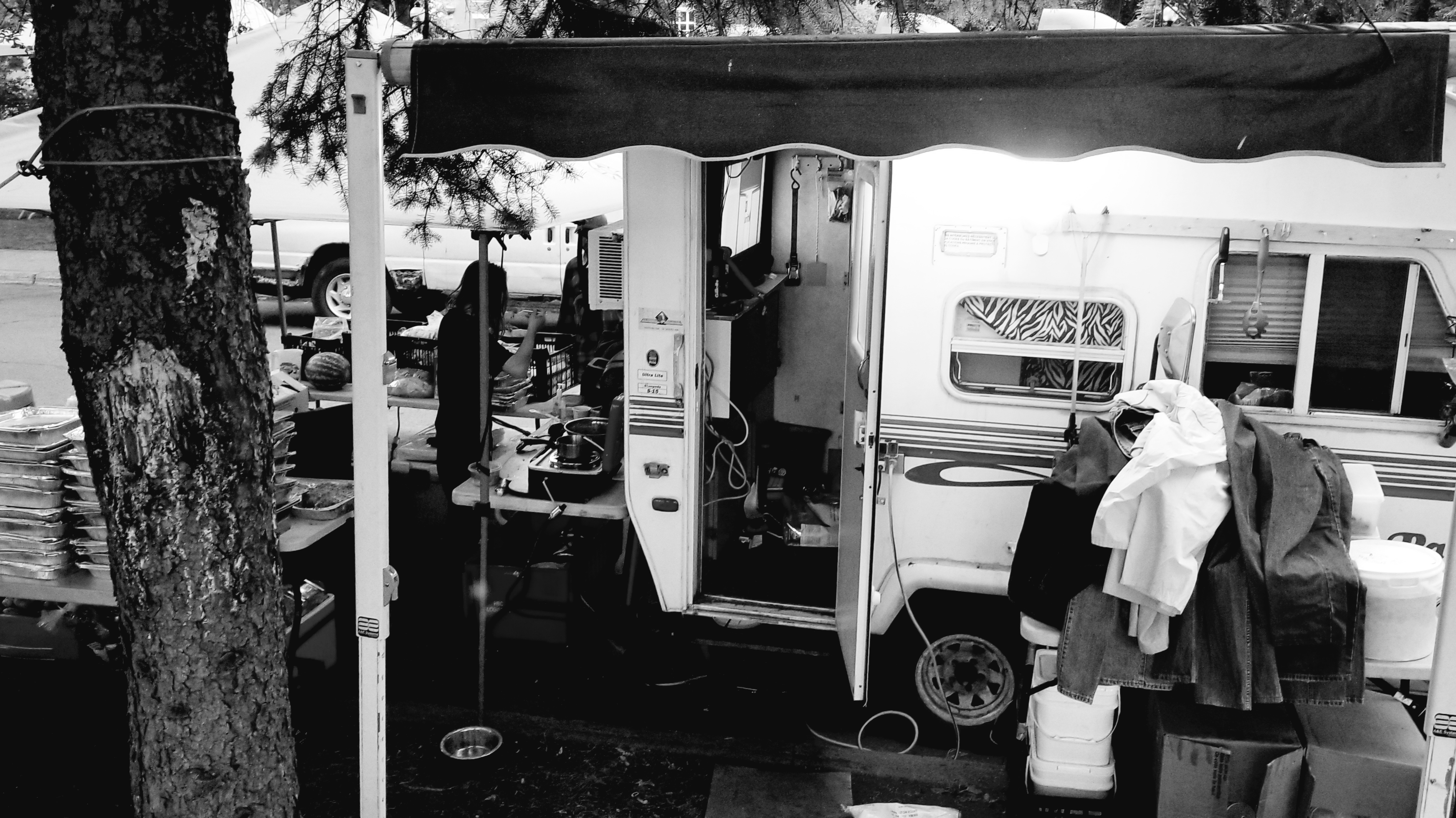
Nous longeons le campement et voyons quelques personnes assises en cercle derrière une bannière où il est écrit « Un chez soi pour tous ». Nous allons les voir, toujours avec la boîte, et l’un d’entre eux prend des lunettes. Une autre personne arrive avec beaucoup d’entrain, avec son assiette de riz et de légumes à la main, nous ayant vu de loin. Il s’exclame malade! en voyant les cahiers de dessin et les crayons de couleur et se sert. Il nous remercie et retourne à son repas.
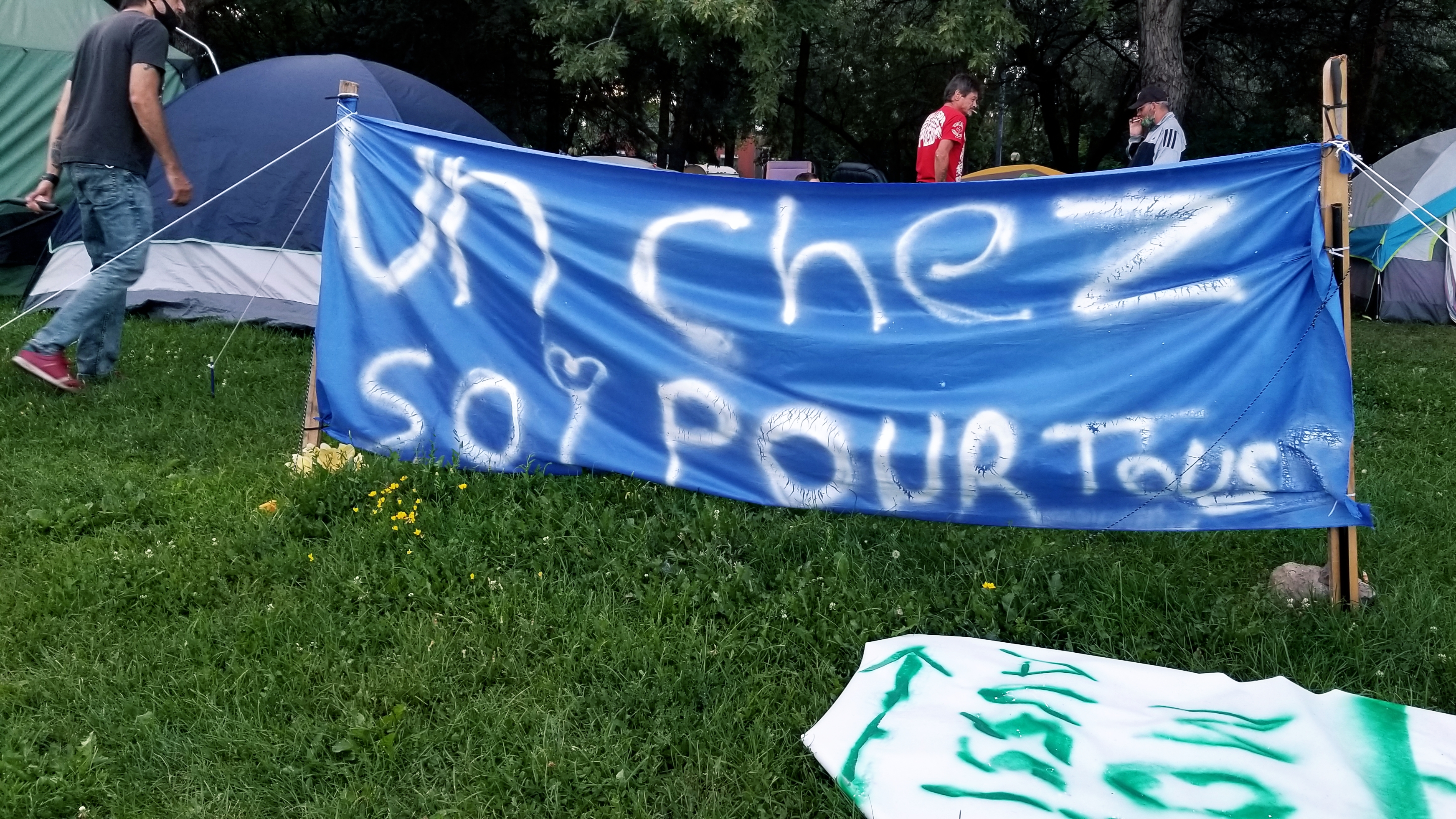
Un peu plus loin, Batone reconnaît un homme accompagné d’une femme et il les salue de loin. La femme reste un peu, mais continue son chemin vers la cafétéria. L’homme m’a vu photographier la deuxième bannière où l’on peut lire « Je veux mon logement. » Il me demande si j’aime sa tente et la bannière et je lui réponds que oui, que c’est une super bonne idée d’avoir fait ça! Il nous dit qu’il a environ 400 mètres de tissus prêt à être utilisé, mais qu’il lui faut de la peinture acrylique, que quelqu’un lui a promis d’en apporter. Il nous raconte aussi que la semaine passée, un politicien est venu ici pour négocier sur le campement. Il lui a crié « T’écoutes jamais anyway! » et comme de fait, il ne s’est pas retourné, n’ayant pas l’air d’écouter. Il raconte tout cela avec le sourire et avant de partir, il nous montre le rhum épicé qu’il a trouvé hier dans un sac d’épicerie à donner, tout content de sa découverte.
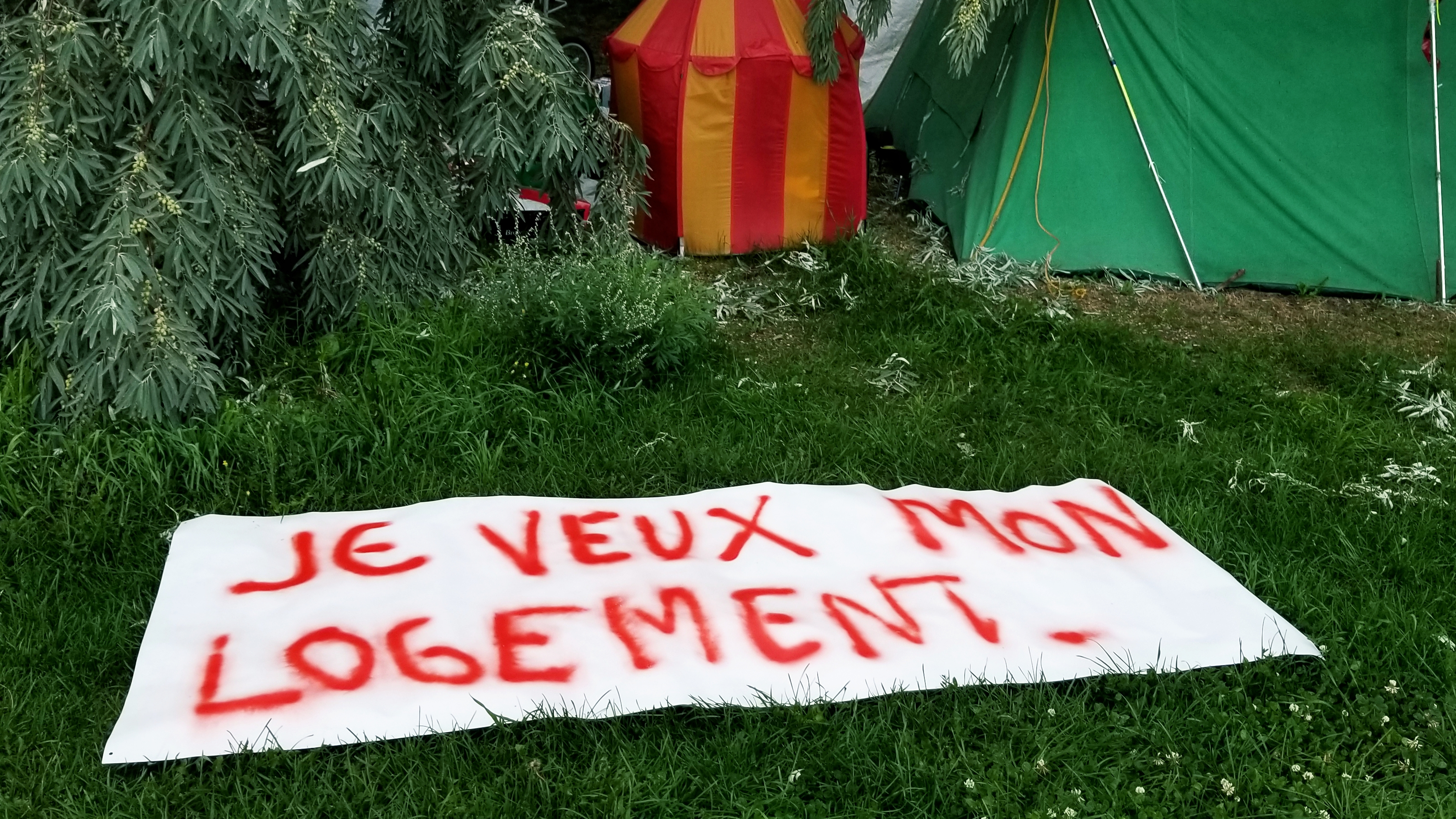
Durant cette soirée de vendredi, nous avons vu quelques moments de frustration, mais surtout de l’espoir. De l’espoir des trois jeunes femmes si généreuses, de l’espoir dans les sourires de ceux et celles à qui nous avons donné la possibilité de pouvoir écrire et dessiner, de l’espoir dans les yeux de Marco qui continue sa recherche de logement, de l’espoir dans tous ceux qui avaient besoin de lunettes de lecture afin de lire à nouveau, de l’espoir dans la voix de la jeune femme qui je crois n’abandonnera pas, de l’espoir dans tous ces moments d’humanité inoubliables!
*Les noms utilisés sont fictifs afin de conserver l'anonymat.
by Maude Blanchet Léger
Friday the 28th of July, I met Batone in the van at Exeko. We drive towards Sherbrooke street and we get to know each other on the way. He explains to me his approach as a mediator. Batone is a guitarist and a singer who composes his own songs. He uses his musical talents to interact with people in the streets. He tends to be rather carried away by the rhythm of the people he meets for his interventions, because according to him, it is more natural to meet people in this way and to have a conversation than when everything is overplanned.
Batone parks the van on Sherbrooke, near Kennedy street, a few meters away from five men sitting on a wall. As we walk towards them, three young women come out of a car with big bags filled with sandwiches and they offer them to the men. We go get some equipment and Batone takes his guitar and we start talking with the girls next to the van. The three friends decided on their own that every Friday, they would roam the streets of Montreal and give out food to the ones in need.
Batone and I find them really inspiring and we explain Exeko’s mission to them. They also ask us where they can find more people who need food and Batone points them to a few places he knows downtown. A corner further away, a man, Marco*, is often seated next to the grocery store on Avenue du Parc. They walk in that direction and Batone and I go back to the five people with the stuff and the guitar.
They welcome us with joy and we ask them if they would like to have a notepad and a pen to write or a sketchbook and pencils to draw. They all want to write, but one of them, sitting at the end, tells me he prefers to draw. His neighbor on the left begins to write instantly and fills out the first page which he signs and dates at the bottom. He shows us his text and I have time to read: "My life on the streets is difficult, but it is a life. He tells us at the same time "You know, it's a life, it's a life..." in a kind of serenity. I then get a notebook and a box of colored pencils for the man that wanted to draw. He has a very calm energy and I notice he has worn a slight smile on his face since we arrived. As soon as he has his sketchbook and pencils in hand, he begins to draw the profile of his neighbor, which is focused on Batone playing the guitar and singing.


It is especially the other two who pay a lot of attention to Batone playing music. I see them smile, move to the beat of the song and the one who was writing is now clapping his hands and showing thumbs up at Batone. The other man then says to me "I'm going to draw you now!" I accept and try to move as little as possible. He shows me his drawing and tells me it's hard to make the eyes and I agree, it is the hardest part of the face to draw! I tell him there is no rush, he can continue it if he wants. He then decides to add color. I ask his permission to photograph his work and he accepts. It's nice to see the openness, the desire to participate and the enthusiasm of these men. All of this and the three girls we met earlier gave me a boost of hope and put me in a good mood.
We then continue our journey to join Marco on Avenue du Parc. Batone, who knows him well, greets him and asks if he feels like chatting. He nods yes and we get out of the van. He then tells us that all of his things had been stolen, so we suggest that we give him back a notepad and a pen. I ask him who robbed him and he says ‘’Other people in the streets… They steal from the poor instead of the rich!" At least, he found a place where he can sleep and be left alone. He's been looking for a year and eight months for a place to live, or even just a room, but everything is too expensive, even if he puts all his money aside in his bank account. He is seeing his social worker next week, whom he has known for two years now. He took a break from searching this last month, because he was too tired of not finding anything. He also tells us about the holes in his shoes and Batone asks him what size he’s wearing: ten or ten and a half.
We then ask him if he ran into three girls with bags and sandwiches, but he says no, it's only been 20 minutes since he arrived, but then one minute later, we see the girls coming towards us! Batone introduces them and they offer Marco a sandwich, but he's not hungry and doesn't want to save it for later. He says he prefers that the food goes to people who are hungry. I'm surprised, and Batone too, that he doesn't want to keep one. He doesn't seem to worry about the future, in a good way. Batone and I talked later about how we spend our time building up a false sense of security and control over everything, when we never really know what can happen to us. Except that he, Marco, just thought everything is going to be alright and even though he looked tired, I could see hope in his gentle, kind eyes.
Before the girls leave, Batone tells them about our project Métissages Urbains and suggests that they write to Exeko if they want to volunteer with us, because the van offers a whole different experience and gives mobility all over Montreal. One of them takes a picture of the van, where the website can be seen, and they continue on their way.
We say goodbye to Marco and wish him to find housing and a good meeting with his social worker. Batone then planned to go to the camp on Notre-Dame, but on the way, we passed a group of about fifteen homeless people on Milton Street at the corner of Parc Avenue. We go around the block to park the van in front of them. Opening the van door, a man sees the guitar case and a big smile appears on his face. He wants to play, but Batone offers to play it for him instead. I also gave two bags of art supplies and water bottles to those who were interested.
Then a lady comes out of the store in front of the van, telling people sitting on the ground, "I'm sorry, but I'm going to ask you not to stand in front of my store please.’’ A man replied gently, "Sorry ma'am, we’ll move." She seems to notice us afterwards and looks at the van and asks us ‘’Who are you?’’ Batone then explains to her that we do mediation through creativity and philosophy. She looks at us, puzzled, but I see that she feels bad for intervening and feels the need to justify her actions. I understand her situation; she explains that it quickly becomes unsanitary in front of her shop and that she is only trying to make a living. Batone tells her that he understands too, but that Exeko is very sensitive to the condition of Indigenous people in Montreal and across Canada. She replied that in our interventions, we should tell people where to go, not to stay in front of private places, like her store. Unfortunately, it’s not that simple. Since the pandemic, all the shelters have run out of space even more, not to mention the repercussions that post-colonialism still has on First Nation communities. However, we don't go on forever, the lady ends up getting inside and we continue on our way.
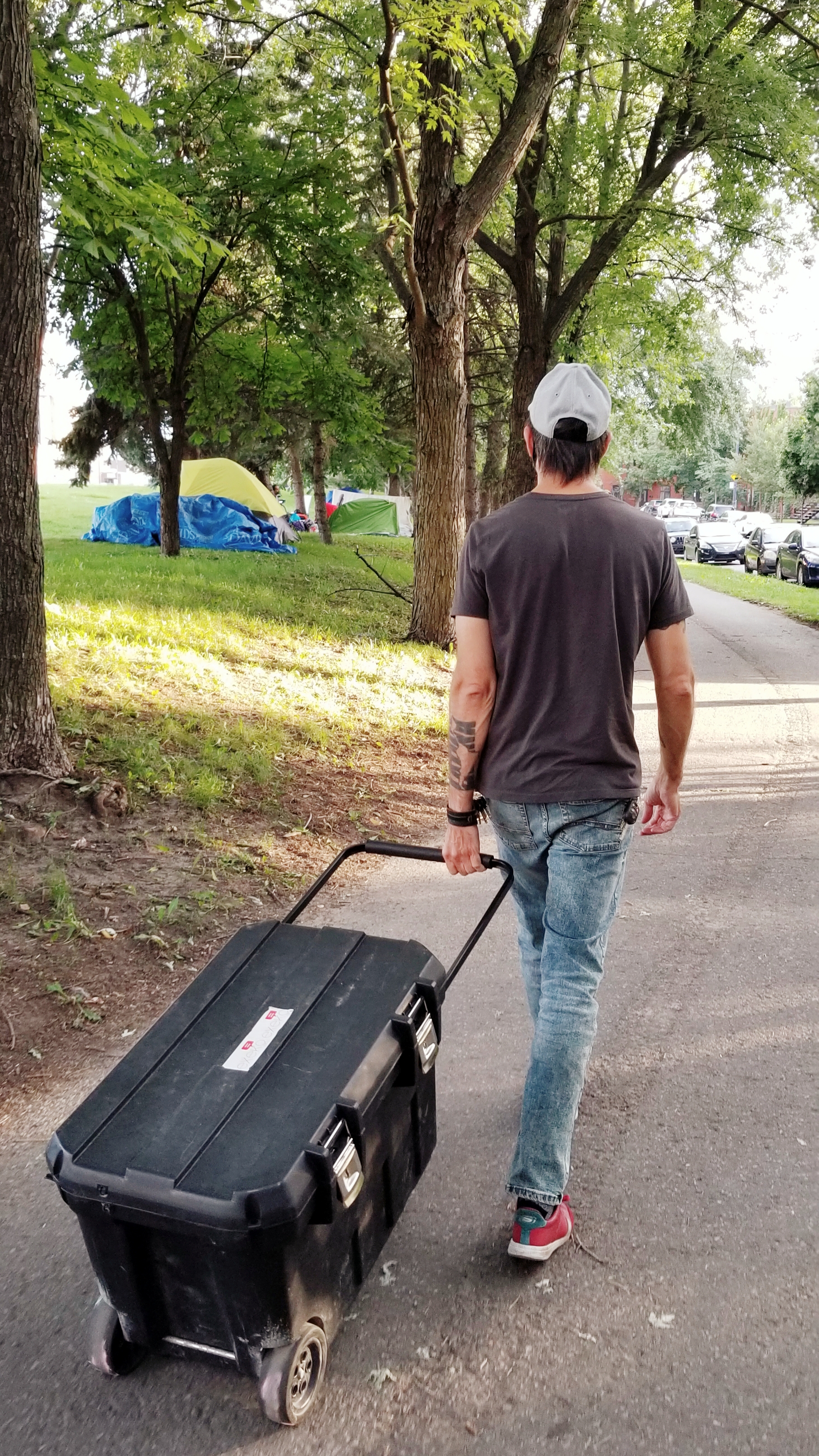
We arrive next to Morgan Park, in Hochelaga, but when parking, I see three tents on Notre-Dame, so I suggest that we go there since we haven't seen anyone in the park. Batone agrees and we walk with the box of books and glasses that we also filled with notebooks, pencils, crosswords, masks, etc.
Four people warmly welcome us to their camp. We introduce ourselves and tell them that we have books and all kinds of materials for them, opening the box. A young woman approaches me, amazed by the books. I help her look for the ones in English and we find two, but she takes two more in French which she found intriguing. She also picks up a hidden-words book, and very excited, tells her friend to come and choose a pair of glasses. I also help them find a good pair and he decides to go with a green pair.
They then return sitting down and start talking with Batone. Meanwhile, the other man comes up to me and also chooses a pair of glasses and three books. Afterward, he sits down too and he tells us that he can finally get back to reading, that it helps him fall asleep at night, and says that it takes him "two sentences, and then poof! I’m gone" and we laugh together. The young woman says she likes to read, but she also likes to sleep, because the next morning is a new day, it’s like turning over a new leaf: there is hope. She and her boyfriend tell us that their home burned down in March and they haven't been able to find another place since. The young Inuit woman tells us with a little trembling voice, a lump in her throat, that she has a house way way up North, nodding her head upwards, but that she tries to... She tries! deciding to stop her sentence there. They also explain that they are not too keen on mingling with larger groups, such as the big camp further west. Batone congratulates them for the atmosphere and the environment they have managed to create together, among friends. It is true that we felt good with them, they inspired me with confidence and peace.
We close the box and move the van to the large camp. We park it behind what appears to be a community cafeteria under a shelter, attached to a recreational vehicle. We greet the people who are cooking and those sitting around. An energetic man walks up to us and describes how he got his vehicle two years ago for $900. He is really proud of it and shows us his generator and all of its facilities inside. They have vegan burritos, fruits, jeans to give away and inside, he has a TV, a poster of a band he and Batone both love, signed by the singer, and a photo of his deceased dog. He then asks us if we have any reading glasses, seeming to know Exeko already, and he also takes out a hidden-words book. I ask for his permission to take a picture of his RV, he accepts, and we congratulate him for deciding to make his house a place of gathering, community and solidarity.

We walk past the camp and see a few people sitting in a circle behind a banner that reads “A home for all”. We go to them with the box, and one of them takes glasses. Another person arrives very spirited, with a plate of rice and vegetables in hand, having seen us from a distance. He exclaims sick! when seeing the sketchbooks and colored pencils and helps himself. He thanks us and returns to his meal.

A little further, Batone recognizes a man accompanied by a woman and greets them from afar. The woman stays for a bit, but continues on her way to the cafeteria. The man saw me photographing the second banner that reads "I want my housing." He asks me if I like his tent and the banner and I tell him yes, it's a great idea that they wrote that! He tells us he has about 400 meters of fabric ready to be used, but he needs acrylic paint, which someone has promised to bring. He also tells us that last week, a politician came here to negotiate on the camp. He shouted at him "You never listen anyway!" And as a matter of fact, he didn't turn around, not seeming to be listening. He tells us all of that with a smile and before leaving, he shows us the spiced rum he found yesterday in a giveaway grocery bag, happy with his discovery.

During that Friday night, we saw a few moments of frustration, but mostly hope. Hope in the three generous young women, hope in the smiles of those given the opportunity to write and draw, hope in the eyes of Marco who continues his search for a place to live, hope in all of those who needed reading glasses in order to read again, hope in the voice of the young woman who I believe will not give up, hope in all these moments of unforgettable humanity!
*Names are fictional in order to keep anonymity.










 Laurier
Laurier